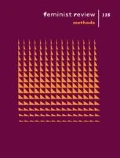Abstract
After years of invisibility, the position of migrant women from Islamic countries now forms the core of the Dutch discourse on integration and emancipation. This article presents the downside of this visibility by showing that it is situated within a growing culturalist discourse. In addition to being culturalist, this discourse focuses on the shortcomings of migrants and is flavoured with a touch of new realism in its argument that it is a right to break the taboos of migrants. More visibility for migrant women will not help their empowerment if the basic assumptions of the dominant discourse are not challenged. Through presenting a case study, this article shows how this visibility can even strengthen the border between the Dutch as ‘emancipated self’ and Islamic migrants as the ‘unemancipated other’. In so doing it reinforces boundaries instead of alliances, isolation instead of empowerment, and suppression instead of emancipation.
Similar content being viewed by others
Notes
The first two phases of the project were presented as master's theses by Tineke Choi and Bianca Balker, respectively. Waldring is the main author of the final report on the project, which includes all three phases (Waldring and Ghorashi, 2007).
This information is provided by the project coordinator later on.
References
Balker, B. (2006) Tot op het bod gemotiveerd! Een onderzoek naar de weg van migrantenvrouwen tot de arbeidsmarkt, Masterthesis, VU University Amsterdam, Amsterdam.
Captain, E. and Ghorashi, H. (2001) ‘Tot behoud van mijn identiteit’ identiteitsvorming binnen de zmv-vrouwenbeweging’ in Botman, M., Jouwe, N. and Wekker, G. (2001) editors, Caleidoscopische visies: de zwarte, migranten- en vluchtelingenvrouwenbeweging in Nederland, Amsterdam: KIT, 153–187.
Choi, T. (2006) Gender- en Etniciteitsubtekst vs. Emancipatie. Over de belemmerende werking van de gender- en etniciteitsubtekst op de emancipatie van migrantenvrouwen, Masterthesis, VU University Amsterdam, Amsterdam.
Collins, P.H. (1991) Black Feminist Thought: Knowledge, Consciousness, and the Politics of Empowerment, New York: Routledge.
Entzinger, H. (1998) ‘Het voorportaal van Nederland; inburgeringsbeleid in een multiculturele samenleving’ in Geuijen, C.H.M. (1998) editor, Multiculturalism, Utrecht: Lemma, 67–81.
Ghorashi, H. (2003) Ways to Survive, Battles to Win: Iranian Women Exiles in the Netherlands and the United States, New York: Nova Science Publishers.
Ghorashi, H. (2005) Refugees: Agents of change or passive victims: The impact of Welfare States (The case of The Netherlands) on Refugees. Journal of Refugee Studies, Vol. 18, No. 2: 182–198.
Ghorashi, H. (2006) Paradoxen van culturele erkenning: Management van diversiteit in nieuw Nederland, Inaugural lecture, VU University Amsterdam, Amsterdam.
Ghorashi, H. and van Tilburg, M. (2006) ‘“When is my dutch good enough”? experiences of refugee women with Dutch labour organisations’ Journal of International Migration and Integration, Vol. 7, No. 1: 51–70.
Glastra, F. (1999) editor, Organisaties en diversiteit: naar een contextuele benadering van intercultureel management, Utrecht: Lemma.
Gowricharn, R. (2002) Het omstreden paradijs: Over multiculturaliteit en sociale cohesie, Inaugural lecture at the University of Tilburg, Tilburg.
Jansen, W. (1996) ‘Dumb and dull: the disregard for the intellectual life of middle eastern women’ Thamyris, Vol. 2: 237–260.
Janssens, M. and Steyaert, C. (2001) Meerstemmigheid: Organiseren met verschil, Leuven: Universitaire Pers Leuven.
Koopmans, R. (2003) ‘Good intentions sometimes make bad policy: a comparison of Dutch and German integration policies’ in Cupeurs, R. Duffek K.A. and Kandel J. (2003) editors, The Challenge of Diversity: European Social Democracy Facing Migration, Integration, and Multi-Culturalism, Innsbruck: Studien Verlag.
Lucassen, L. (2006) ‘Gelijkheid en onbehagen: de wortels van het integratiedebat in West-Europa’ in Lucassen, L. and Willems W. (2006) editors, Gelijkheid en onbehagen Over steden, nieuwkomers en nationaal geheugenverlies, Amsterdam: Bert Bakker.
Lutz, H. (1997) ‘The limits of European-ness: immigrant women in fortress Europe’ Feminist Review, Vol. 57: 93–111.
Lutz, H. (2002) ‘Zonder blikken of blozen: het standpunt van de (nieuw-) realisten’ Tijdschrift voor Genderstudies, Vol. 3: 7–17.
Lutz, H. and Moors, A. (1989) ‘De mythe van de ander: beeldvorming over Turkse migrantes in Nederland’ Lover, Vol. 16, No. 1: 4–7.
Okin, S.M. (1999) ‘Is multiculturalism bad for women?’ in Cohen, J. Howard M. and Nussbaum M.C. (1999) editors, Princeton: Princeton University Press.
Prins, B (2002) ‘The nerve to break taboos. New realism in the Dutch discourse on multiculturalism’ Journal of International Migration and Integration, Vol. 3&4: 363–379.
Prins, B. (2004[2000]) Voorbij de onschuld: Het debat over integratie in Nederland, Amsterdam: Van Gennep.
Rath, J. (1991) Minorisering: De sociale constructie van ‘etnische minderheden’, Amsterdam: Sua.
Räthzel, N. (1995) ‘Nationalism and gender in West Europe: the German case’ in Lutz, H. et al. (1995) editors, Crossfires: Nationalism, Racism and Gender in Europe, London: Pluto Press, 161–190.
Roggeband, C. and Verloo, M. (2007) ‘Dutch women are liberated, migrant women are a problem: the evaluation of policy frames on gender and migration in the Netherlands (1995–2005)’ Social Policy and Administration, Vol. 3: 271–288.
Saharso, S. (2002) ‘Een vrouw met twee missies: reactie op Helma Lutz’ Tijdschrift voor Genderstudies, Vol. 3: 18–23.
Spijkerboer, T. (1994) ‘Sheherazade en haar zusters’ Nemesis, Vol. 4: 95–106.
Spijkerboer, T. (1999) Gender and Refugee Status, Nijmegen: Gerard Noodt Instituut.
Stolcke, V. (1995) ‘Talking culture: new boundaries, new rhetorics of exclusion in Europe’ Current Anthropology, Vol. 1: 1–24.
UNDP (2004) Human Development Report 2004: Cultural Liberty in Today's Diverse World, the United Nations Development Programme, New York.
Waldring, I. and Ghorashi, H. (2007) Bureau Parkstad ‘Vrouwenstemmen kleuren de vernieuwing, Unpublished report, VU University Amsterdam.
Wekker, G. and Lutz, H. (2001) ‘Een hoogvlakte met koude winden. De geschiedenis van het gender- en etniciteitsdenken in Nederland’ in Botman, M. Jouwe N. and Wekker G. (2001) editors, Caleidoscopische visies: de zwarte migranten- en vluchtelingenvrouwenbeweging in Nederland, Amsterdam: KIT.
Wilterdink, N. (1998) ‘Mondialisering, migratie en multiculturaliteit’ in Geuijen, C.H.M. (1998) editor, Multiculturalisme, Utrecht: Lemma, 55–67.
Rights and permissions
About this article
Cite this article
Ghorashi, H. from absolute invisibility to extreme visibility: emancipation trajectory of migrant women in the Netherlands. Fem Rev 94, 75–92 (2010). https://doi.org/10.1057/fr.2009.38
Published:
Issue Date:
DOI: https://doi.org/10.1057/fr.2009.38




